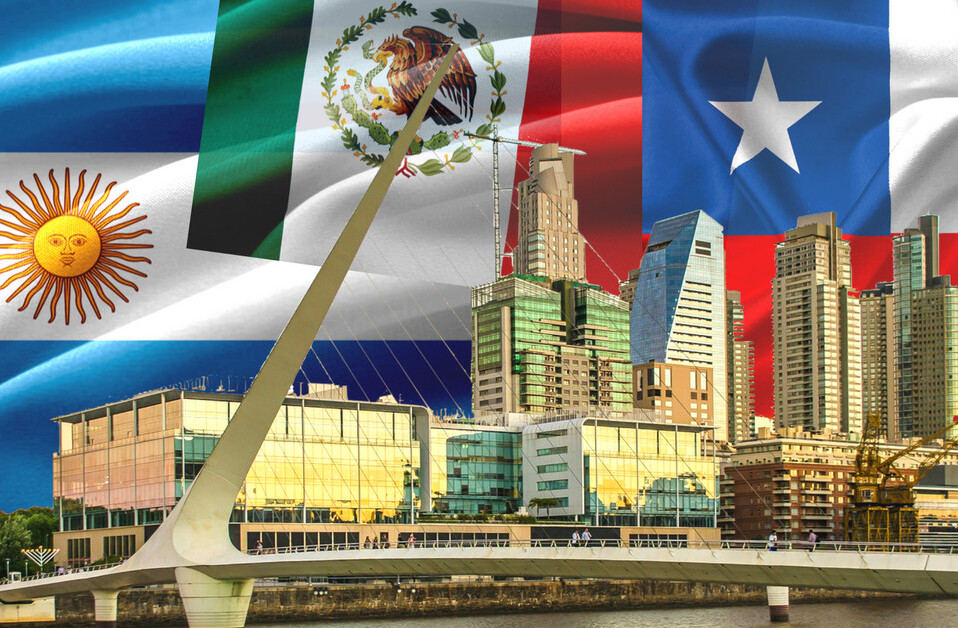
2013 was a transition year in Latin America. After a period of excessive hype around startups and foreign investment, the noise quietened down as everyone went back to work. In other words: less talk, more results. Let’s take a look back at some of the latter:
Building a sustainable ecosystem
There’s no doubt about it, the mood in Latin America’s startup scene has shifted. Foreign players that were just testing the waters have left, valuations are more rational, accelerators have stopped sprouting like mushrooms and copycats are not seen as a safe road to success anymore. However, we think this change is not the result of worries regarding macro-economic factors across the region. Instead, it seems to be a natural phase of the ecosystem’s growth, and not necessarily a bad one at all:
“The market has stabilized. Latin America’s best companies still find money, and the pipeline is very good,” MD and co-founder at Redpoint e.ventures (RPeV) Yann de Vries said when we talked to him a few months ago as Sequoia Capital was departing Brazil.
In addition, the startup community is becoming more transparent; critical voices are starting to be heard and some issues that would have previously been swept under the rug are now being discussed.
To give a few examples, Argentine VC Gonzalo Costa recently warned Latin American entrepreneurs against the temptation of an early exit, Alejandro Burato called out the disconnect between entry and exit valuations, Juan Pablo Cappello wrote about zombie startups, while Brazilian entrepreneur Matt Montenegro took to his blog to openly criticize Start-Up Brasil (more on this later).
Some are also using humor to bring their message across, such as hilarious comic series StartupComedyTV (in Portuguese) and parody Twitter account Startupi Sincero:
Demo Day é demodê
— Startupi Sincero (@StartupiSincero) December 18, 2013
It’s worth clarifying that this evolution doesn’t mean that Latin America’s startup community is getting more judgmental. On the contrary, it is making concerted efforts to become more accepting of failure.

On one hand, failed startups are more willing to share their stories, like Nuflick and Shoes4You did when they closed shop in 2013. On the other hand, entrepreneurs are keener to listen. Earlier in 2013, startup conference FailCon held its second Brazilian edition in Porto Alegre. In addition, a new event series called FuckUp Nights is spreading out quickly; it was recently mentioned in Spanish newspaper El Pais, and already held out events in many Mexican cities as well as in India (Mumbai), Colombia (Medellin) and Spain (San Sebastian).
Market fundamentals to know, part 1: E-commerce keeps growing
It is interesting to see that slower growth and persistent inflation in many Latin American countries haven’t managed to stop the continuing rise of e-commerce. According to Forrester’s latest 5-year Latin America Online Retail Forecast, combined online retail in Brazil, Argentina and Mexico are set to more than double from almost $20 billion in 2013 to $47 billion in 2018.
As usual, it is important to keep in mind that Latin America is anything but a homogenous block. When it comes to e-commerce, this means that some countries are way further along the line than other. As Forrester points out, online retail sales of $15 billion in Brazil in 2013 are more than triple those for Mexico and Argentina combined, and the country is expected to remain Latin America’s largest e-commerce market by a wide margin.
Conversely, this means that there is still plenty of room for growth in markets such as Argentina and Mexico, where online retailers still have to include lower-middle class customers and work on building consumer trust. In that sense, all the issues that have surrounded operations such as Black Friday in Brazil and Cyber Monday in Argentina and Chile are doing no good to the ecosystem.
Different growth stages aside, most Latin American markets share several factors that unite them: a relatively young population, a fast-growing middle class doing their first online purchases, socially engaged Internet users and a changing financial landscape where digital payment methods are still new. These are some of the elements that foreign and local players have to integrate into their strategies if they want to ride this tide.
Market fundamentals to know, part 2: Mobile on the rise
Mobile devices are making progress all across Latin America. While smartphones still aren’t the rule, they are expected to become more and more common in coming years. According to the GSM Association (GSMA), smartphone penetration in the region is expected to reach 44% in 2017, compared to 20% in 2012, tech blog Alt1040 reported earlier this year.
It’s important to keep in mind that the Latin American mobile market is still dominated by Android. However, its growth will partly be fueled by the emergence of more affordable devices running on other platforms, such as Mozilla’s Firefox OS devices and Nokia’s Asha 500, which will ship for only $69 in Africa, Asia-Pacific, Europe, Latin America and the Middle East.
While it remains to be seen how popular that Nokia model will be, figures are already available for Firefox OS. Last October, Telefónica’s director of Open Web Services Yotam Ben-Ami revealed that “Firefox now represents over 12 percent of smartphone sales in Venezuela and almost 9 percent in Colombia.”

Despite the emergence of lower-priced devices, access to electronics at a reasonable price remains a problem in most countries, due to a mix of heavy taxes, barriers to entry and high margins (see our previous story). To name two recent examples, Sony announced that it would sell the PlayStation 4 for $1,853 in Brazil, more than four times its asking price in the US. Even the most basic iPhone 5C costs R$1,999 in the country, around $846, failing to meet expectations for an affordable Apple device.
Surfing the heat wave
Some verticals have become really hot in Latin America in 2013, with a mix of exits, new investments and foreign entrants. Talking to Brazilian media outlet Exame a couple of weeks ago, iFood‘s CEO Felipe Fioravante predicted that 2014 would be the year of food delivery. His company is definitely close to the action; back in February 2013, it raised $2.6 million from Movile.
Close competitor HelloFood is backed by Rocket Internet and went on a shopping spree in 2013, acquiring Peixe Urbano Delivery, Jánamesa and MegaMenu to boost its growth. In a recent post about this space, PulsoSocial also listed other players to watch, such as ClickDelivery, Disk Cook, PedidosYa, PickEat and SinImanes, which merged with SeMeAntoja a few months ago. Several of these have already raised funding to expand beyond their own country, such as above-mentioned PedidosYa, which operates in nine countries with backing from Kaszek Ventures and London-based fund Atomico.
Considering the growth of e-commerce that we described earlier, it’s not surprising to see online retail attract major investments. For example, Brazil-based online fashion company Dafiti unveiled a $70 million investment from Canada’s Ontario Teachers’ Pension Plan (OTPP), which itself followed several rounds of funding, including a $45 million investment from J.P. Morgan in August 2012. As for fellow Rocket-backed e-commerce company Linio, it raised a total of around $100 million, including a recent round from Mexican VC firm Latin Idea Ventures to deepen its presence throughout the region.
Some other big names to watch include Netshoes, Baby.com.br and Bebê Store, as well as newcomer Avenida.com, which we listed as one of Latin America’s most promising companies for 2014.

In addition, foreign players are also assessing opportunities. For example, eBay launched its app eBay Fashion in Brazil, making it the first eBay-branded product in the country and announced the translation of its main platform into Portuguese last September, hinting at larger plans.
E-commerce aside, several other verticals have investors and buyers on their toes, such as online real estate, with players such as Rocket-backed Lamudi, fast-growing VivaReal and Argentina’s Properati, which recently bought a competitor to boost its Brazilian presence.
The acquisition of Argentine company Eventioz by Eventbrite is also a sign that the event ticketing space is heating up. This is good news for Sympla, a Brazilian company that follows a similar model and is reportedly on track to hit R$20 million in revenue (around $8.48 million) in 2014.

More and more Latin American companies are disrupting finance, and this trend recently resulted in an exit with the acquisition of Lemon by LifeLock. Another newsworthy exit this year was the purchase of social travel startup WeHostels by StudentUniverse.
While WeHostels was headquartered in New York City, it graduated from Start-Up Chile and NXTP Labs’ acceleration program, a large part of its team has been based in Colombia and its CEO Diego Saez-Gil himself is Argentinian. This means that its exit is good news for Latin America’s tech scene in general and for several investors who benefited from this deal, such as Quotidian Ventures, Torrenegra Labs and Fabrice Grinda.
Education has also gathered attention in Latin America in 2013, alongside the freelance marketplace segment, with players such as Workana, Nubelo and GetNinjas. Taxi apps have also been competing fiercely, and will face a new entrant in more cities next years as car service Uber expands its presence in Latin America.
Two other segments have also attracted foreign companies into Latin America: online music streaming, with massive rollouts from Spotify and Rdio, and online media, with the release or announced launch of Brazilian Portuguese editions of El Pais, the Financial Times, Buzzfeed and The Huffington Post.
Next: Start-Up Latin America…
Start-Up Latin America
Several Latin American countries have been keen to follow the footsteps of Start-Up Chile and begin to offer federal support to early-stage startups. As you may know, the Chilean program is gearing up to welcome its ninth batch of startups, while hoping to get renewed after the presidency changes hands next March.

No matter what happens next, Start-Up Chile deserves kudos for being very supportive of other countries’ initiatives such as Start-Up Brasil, with whom it held a joint Demo Day.
As we reported, all programs have their differences; for instance, newcomer Start-Up Peru only accepts teams with a majority of Peruvian nationals or residents. Compared to Start-Up Chile, Start-Up Brasil is less centralized, thanks to partnerships with several shortlisted accelerators. This seems to make sense in such a large country, but it generated controversy around the existing relationship between some selected startups and accelerators, while these in turn wished to have more control of the pipeline.
Start-Up Brasil also put more emphasis on academic credits than Chile, which caused some bureaucratic hurdles during the first edition of the program. All in all, this criticism resulted in a smaller number of applications for the program’s second acceleration cycle, a trend it will likely try to correct in 2014.
While they didn’t use the “Start-Up” branding, other Latin American countries also offer support to their startups, with initiatives such as iNNpulsa in Colombia and Mexico’s National Entrepreneur Institute (INADEM). Besides federal governments, some states have also launched their own programs, such as Minas Gerais’ SEED and Rio de Janeiro’s Startup Rio, while cities like Medellin are also promoting entrepreneurship.
This public support complements the increasing amount of private funding available for Latin American startups. According to angel association Anjos do Brasil, angel investment in Brazil grew 25% between November 2012 and 2013. In its report on Latin America’s PE/VC activity in the first half of 2013, trade organization LAVCA noted that “investments closed by VCs, accelerators, and angels (ranging from seed to expansion) rose to US$152m across 58 deals, representing a 69 percent rise in capital committed and a record number of early stage deals in the region [compared to the first half of 2012].”
These investments do not always come from OECD countries. For instance, Chinese Internet firm Qihoo 360 Technology Company led a $30 million Series C round in Brazilian cloud-based online security company PSafe, which shows that Chinese investors seem to be testing the ground more frequently across Latin America.
Promoting diversity
Many Latin Americans dream of running their own business. This is also true of women, who are quite well represented among new business owners: according to a World Bank-IFC Enterprise survey, more than 40% of businesses registered in Latin America and the Caribbean are owned by women.
However, these are still underrepresented in tech entrepreneurship and less connected to its ecosystem and investors. This is an issue that deserves to be addressed, not only for social justice but also due to the tech worker gap in Latin America. For example, recent reports predict that Brazil will be lacking 200,000 IT professionals in 2013.
As a result, several organizations have launched initiatives and events to promote and showcase female entrepreneurship in the startup world. For instance, Women 2.0 has been holding Founder Fridays in 20 cities worldwide, including in Latin America.
As for Women 2.0’s former partner organization in the Spanish speaking world, Ellas 2.0, it changed its name to Ellas² after declining to be acquired by its US counterpart, and launched new initiatives for Latin America, such as online meetup series Ellas Conectan. More recently, it organized a women-oriented conference and pitch competition in Miami called WeXchange, whose winner LastRoom was recently featured in our list of startups to watch in 2014.

Other organizations worth mentioning include Girls On It, whose CEO Robyn Cohen is based in Brazil; Girls in Tech, which opened chapters in Brazil and Chile; and Girls Who Code, whose summer program is coming to Miami in 2014.
Still in the US, a new incubator called Manos Accelerator was born with the intent to showcase and support Hispanic entrepreneurs. As we noted last October, five out of the seven companies in its first class also happened to have at least one female founder. Manos has been backed by Google for Entrepreneurs, and held its first Demo Day at Google’s Mountain View headquarters last November.

Back in South America, Coderise is also working on making the tech scene more socially inclusive, with a program that “empowers young students with scarce resources in developing nations by training them in the programming skills most in demand today.” Initially launched in Colombia, the program is gearing up to move into Peru in the near future.
The year ahead

Latin America’s tech scene should see at least one IPO in 2014, as Argentine company Globant is said to be gearing up to hold one in the first quarter of the year. Other potential IPO candidates in the next few years also include travel booking platform Despegar, as well as Open English, which received $65 million in Series D funding in 2013 with a reported valuation of approximately $350 million. Still, it remains to be seen whether 2014 will bring as many exits as hoped, and whether their valuations will meet expectations.

While the upcoming FIFA World Cup will put Brazil in the spotlight, the short-term impact that this big event will have on the tech scene, and worries have already emerged that 2014 may only have “three working months” due to the fact that elections are also taking place in November. In other words, the country’s “Internet Constitution” (Marco Civil) may still have to wait a few months in legal limbo and undergo further lobbying that could undermine its final content.
As we previously reported, US tech giants already have plans in Latin America this year, such as Apple, which will open its first retail store in Brazil, and Microsoft, which will open an Innovation Center in Chile and launch a Windows Azure region for Brazil. As for Google, which already expanded some of its services in Latin America last year, it will be interesting to see whether it finally takes a decision regarding its moribund social network Orkut.
Looking for further reading? Here are 10 of our 2013 posts you should catch up on:
- 45 things you didn’t know about Brazil and Latin America
- Brazil is using the law to push innovation, but here’s how it can do more
- Coolest offices: Inside 9 awesome tech workplaces in São Paulo
- Everything you need to know to create the next big company in Latin America
- Funding for Latin American startups: Is winter coming?
- How .CO domains attracted 1.4 million registrations and what’s next
- Latin America’s wanna-be Silicon Valleys have to face an inconvenient truth: The need for immigration
- Latin American startups are ninja innovators
- Web 2.0 in Latin America: Why we blew it and what we can do to fix it
- Zombies are about to invade Latin America
Image credit: Julia Manzerova via Flickr
Get the TNW newsletter
Get the most important tech news in your inbox each week.




